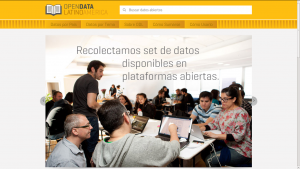
Inspired by the open data portal created by ICFJ Knight International Journalism Fellow Justin Arenstein in Africa, OpenData Latinoamérica is supported by the World Bank Institute.
OpenData Latinoamérica aims to improve the use of data in this region where data sets too often fail to show up where they should, and when they do, are scattered about the web at governmental repositories and multiple independent repositories where the data is removed too quickly.
The aim is to create a data repository to store information coming systematically from governments throughout the region, from non-governmental organizations or from journalists and hackers who have obtained data themselves. This way, we will be able to quickly group invaluable information resources around a community interested in using open data, and we can promote the release of new data. Your organization can take part in OpenData Latinoamérica.
Read the full post on IJNet.
The International Journalists' Network, IJNet, keeps professional and citizen journalists up to date on the latest media innovations, online journalism resources, training opportunities and expert advice. ICFJ produces IJNet in seven languages: Arabic, Chinese, English, Persian, Portuguese, Russian and Spanish. IJNet is supported by donors including the John S. and James L. Knight Foundation.